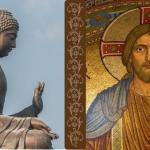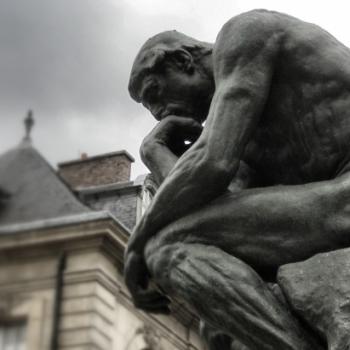
In this article, I’ll consider the difference between the religion of certainty and the religion of mystery. The two approaches are not confined to any particular religion. Rather, they are found in all of the world’s wisdom traditions because they speak to two ways of thinking.
The Religion of Certainty
The world is chaotic, and our place in it is insecure. Because uncertainty is universally true, every religion and wisdom tradition has attempted to provide a sense of certainty from inception. They have offered explanations for the inexplicable and provided rules of conduct, such as, do this, and you will get a guaranteed outcome. Certainty is alluring. We are all looking for it one way or another. What will happen tomorrow, next year, after I die? Wouldn’t it be great to know?
Because of its universal appeal, all of the traditions, bar none, have participated in storytelling and rulemaking to create feelings of certainty.
The Religion of Mystery
Still, in every tradition, you will also find those who practice the religion of mystery. To paraphrase Huston Smith, the word mystery here does refer to the so-called ‘murder mystery,’ which is actually a puzzle because it can be solved. No, the original definition of mystery is “something that is difficult or impossible to understand.”
While not intertwined with the word mystic (I looked it up), many of the world’s mystics have approached the world with childlike wonder, as if everything were a mystery.
The religion of mystery inspires awe and humility. Instead of pretending to understand everything, practitioners revel in the unknown.
To give an example, the ancient yogic rishis concluded that the world is unknowable. So, instead of trying to understand the world, they set out to understand themselves better, focusing on the drop rather than the ocean.
Stark Contrast
These two religious perspectives produce worldviews in stark contrast with each other.
Certainty thrives on absolutes. Doubters are shunned if they try to undermine the stories on which their conviction is based. Strict rules are formulated to further cement a sense of certainty; to make sure everyone behaves in predictable ways. Right behavior is championed. Wrong behavior is punished.
Mystery thrives on openness and humility. Traditions that revolve around mystery follow basic philosophical principles but allow for discussions and changes to belief systems as needed. Practices are geared toward personal experiences of nature, energy, consciousness, higher power, and other aspects of the unknowable universe. Gatherings of truth are constituted where practitioners and seekers can discuss their experiences and share insights and outcomes.
Law: Everything Changes
The law of impermanency is the only constant in the created universe—everything changes. I am not saying that the religion of mystery is better than the religion of certainty. I am merely stating a fact.
That said, human beings need predictability to function. The religion of certainty fulfills that role to some degree. However, because everything changes, all religions of certainty could benefit from some sort of mechanism that allows them to make glacial intentional changes over time.
Looking back, you will see that all the wisdom traditions have changed from their original form. Even those who portend to be originalists believe and practice something far different from what once was. This is both natural and normal. But traditions that do not have built-in mechanisms for managing change will have had little or no say in the process.
Mystery Also Needs Structure
Dwelling in endless mystery and uncertainty can drive ordinary people insane, which is one reason why it is for the select few only. Still, even those who can withstand such an open state need some structure to function, some predictability.
Zen practitioners understand this. Their most famous saying is: Before enlightenment, chop wood and carry water. After enlightenment, chop wood and carry water. It speaks to the fact that the structure of human life continues even though the mind dwells in mystery.
More Mystery
My conclusion is that today’s world could use more mystery. Even among people who are not religious, we see that their political and social views are becoming more and more steeped in certainty. This creates closed-mindedness and harsh judgment. In contrast, mystery reminds people to utter the words “I don’t know” at regular intervals and revel in feelings of mystery. Dwelling in mystery will make them more humble, open and non-judgemental.
We could use more of that.
After all, life is a mystery.
Gudjon Bergmann
Author and Mindfulness Teacher
Amazon Author Profile
Recommended books:
- Monk of All Faiths: Inspired by The Prophet (fiction)
- Spiritual in My Own Way (memoir)
- Co-Human Harmony: Using Our Shared Humanity to Bridge Divides (nonfiction)
- Experifaith: At the Heart of Every Religion (nonfiction)
- Premature Holiness: Five Weeks at the Ashram (novel)
- The Meditating Psychiatrist Who Tried to Kill Himself (novel)
Picture: CC0 License












